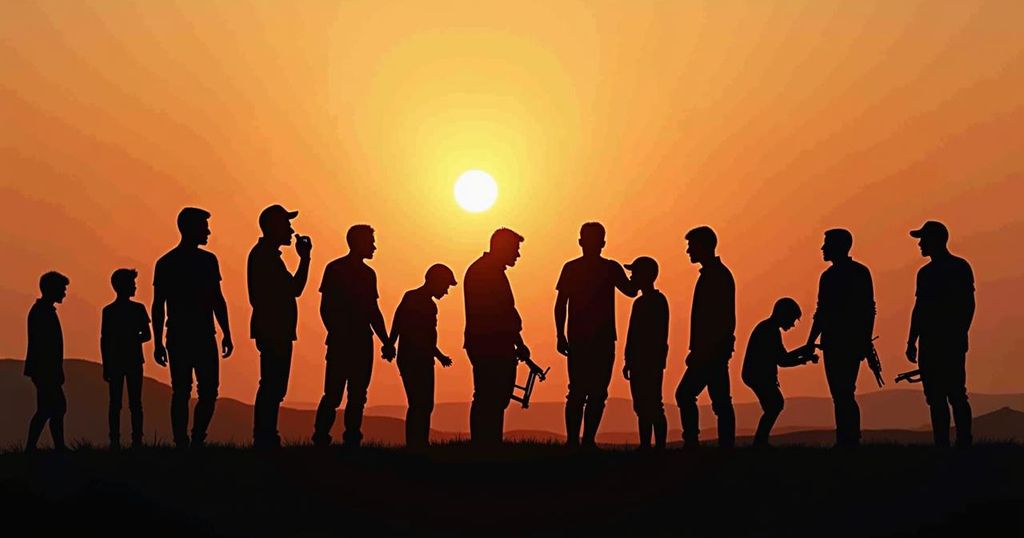Fear and Jubilation: The Iranian Response to the Missile Attack on Israel
Following Iran’s missile attack on Israel, reactions varied widely, with celebratory gatherings in cities alongside concerns of impending war. The Iranian government and citizens expressed pride in the military action, while apprehensions grew over potential repercussions, including Israeli retaliation. The incident highlights the duality of national pride and fear that characterizes current sentiments in Iran amid escalating regional tensions.
In the aftermath of the unprecedented ballistic missile attack by the Islamic Revolutionary Guard Corps (IRGC) on Israel, a multifaceted reaction has emerged from the Iranian populace. On the evening of the strike, major cities in Iran saw celebratory gatherings, with many citizens expressing jubilation over the attack, particularly those who had long advocated for a forceful response against Israel. State-sponsored messages urged attendance at rallies to support the offensive, showcasing fireworks and patriotic songs honoring the Iranian armed forces and their allies in Lebanon, such as Hezbollah. Live broadcasts featured commentators exulting over missiles striking Israeli territories, one declaring, “Where else are you looking for a subject Hollywood, watch this and enjoy” in a tone reflecting national pride and vindication. However, there remains a significant undercurrent of concern among the Iranian population regarding the potential ramifications of this military action, with a number of citizens expressing fear of another devastating war. Recent events, including significant casualties in Lebanon and Gaza from Israeli strikes, have exacerbated these anxieties. One Iranian citizen reflected, “I was so afraid last night, we considered packing up and leaving town with our family.” Amid these fears, social media platforms have become a crucible for humor and coping mechanisms, with citizens posting jokes that reflect both the absurdity and severity of their situation, such as jokes about dodging missiles. Moreover, the geopolitical implications of the attack have prompted varied responses, including a video from Israeli Prime Minister Benjamin Netanyahu addressing the Iranian people and an Israeli military spokesperson issuing warnings of retaliation against Iran. As the situation continues to develop, opposition to the current Iranian regime has surfaced among some individuals, with expressions of support for Israel emerging in cyberspace. In response to these expressions, the IRGC’s intelligence department has called for vigilance among citizens, urging them to report any perceived support for Israel.
The Iranian missile strike on Israel signifies a notable escalation in regional tensions, reflective of ongoing conflicts involving Iran and its allies against Israeli military operations. The strike was a reaction not only to the specific events surrounding recent Israeli operations but also encapsulated a broader context marked by historical hostilities between the two nations. Iran’s motivation for such military action can be traced back to a desire to demonstrate strength and solidarity with allied groups in the region, particularly Hezbollah. Furthermore, the Iranian government has historically emphasized its position in the ‘axis of resistance’ against Israeli influence, often framing military actions as necessary retaliatory measures. This sentiment is compounded by significant public sentiment in favor of retaliation, despite the risks of provoking further conflict. The celebration of missile strikes in Iranian urban centers indicates a segment of the populace feeling empowered by military actions, a stark contrast to the apprehensions regarding the potential consequences of an escalating war.
In summary, the missile attack on Israel by Iran has ignited a complex tapestry of emotions within the Iranian public, ranging from jubilation to fear. While the Iranian regime may rally support through state-organized celebrations and media broadcasts, a substantial segment of the population grapples with the potential for another devastating regional conflict. The overall sentiment captures the duality of pride in military accomplishments and the underlying anxiety of heightened warfare risks, illustrating the deep-rooted tensions that characterize the region. As both domestic and international responses unfold, the situation remains precarious, requiring careful monitoring and diplomatic engagement to avert further escalation.
Original Source: www.aljazeera.com




Post Comment